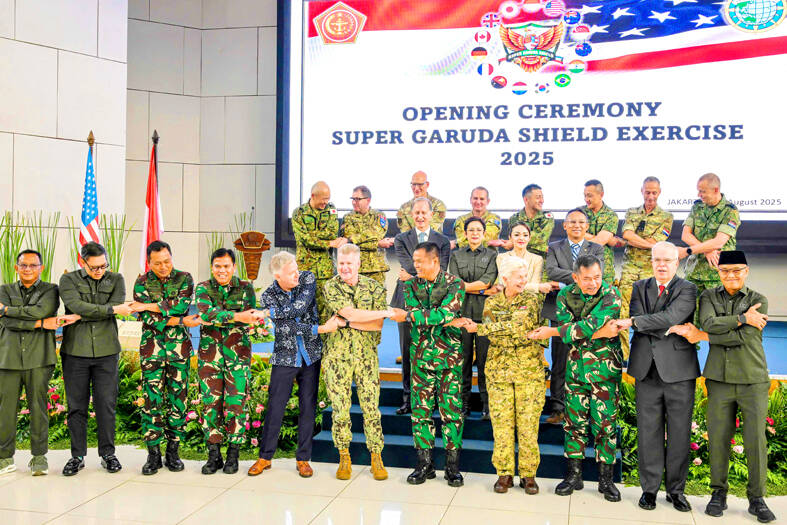Indonesia and the US yesterday began annual joint military exercises together with forces from a dozen other countries, as Washington pushes its allies to take threats from China more seriously.
Hosted by the Indonesian National Armed Forces (TNI), this year’s Super Garuda Shield focused on strengthening regional ties in an increasingly unstable global landscape, TNI Deputy Commander General Tandyo Budi Revita said.
“It serves as a joint exercise where we stand together to respond to every challenge quickly and precisely,” he said at the opening ceremony, along with US Indo-Pacific Command Admiral Samuel Paparo.

Photo: AFP
The exercise has been held annually in Jakarta by US and Indonesian soldiers since 2009. The list of participants expanded since 2022 to include Australia, Japan, Singapore, the UK, France, Canada, Germany, the Netherlands, New Zealand, Brazil and South Korea, bringing the total number of troops taking part in the drill to 6,500.
Paparo said the expanded participants symbolizes a commitment to partnership and to the sovereignty of each country through mutual respect.
“It represents deterring anyone that would hope to change the facts on the ground using violence with the collective determination of all participants to uphold the principles of sovereignty,” Paparo said.
Jakarta has expressed concern about what it sees as Chinese encroachment on its exclusive economic zone in the South China Sea, while maintaining generally positive ties with Beijing.
Several Asian countries also sent observers to the 11-day combat exercise in Jakarta and on Sumatra island. The exercises are to end on Thursday next week with a combined live-fire drill.
The expanded drills have sparked concern from China, which accused the US of trying to build an “Asian NATO” to limit China’s growing military and diplomatic influence in the region.
During a recent speech in Singapore, US Secretary of Defense Pete Hegseth cautioned that seeking US military support while relying on Chinese economic support carries risk.
Hegseth said Washington has been strengthening an arc of military alliances in the Indo-Pacific region to reassure allies alarmed by Beijing’s increasing military and economic pressure, and provocative actions in the disputed South China Sea.
Although increased activities by Chinese coast guard vessels and fishing boats in the area have unnerved Jakarta, Indonesia has sought to avoid confrontation and continued economic initiatives with China.
Jakarta’s decision to sidestep the issue is consistent with its longstanding policy of keeping friction with Beijing behind closed doors, especially given the scale of Chinese trade and investment in the Indonesian economy, said Muhammad Zulfikar Rakhmat and Yeta Purnama, researchers at the Center of Economic and Law Studies.
“This dual-track diplomacy might seem inconsistent, but for Jakarta, it is strategic. Indonesia is embracing defense diversification, not alignment,” Rakhmat said.
The country has remained committed to Super Garuda Shield, and continued purchasing US and French arms and developing interoperability with Western militaries, he added.
“In a region defined by rising tensions and great power rivalry, Indonesia’s refusal to choose sides, at least in defense, might be its strongest asset,” Rakhmat said.

Taiwan is projected to lose a working-age population of about 6.67 million people in two waves of retirement in the coming years, as the nation confronts accelerating demographic decline and a shortage of younger workers to take their place, the Ministry of the Interior said. Taiwan experienced its largest baby boom between 1958 and 1966, when the population grew by 3.78 million, followed by a second surge of 2.89 million between 1976 and 1982, ministry data showed. In 2023, the first of those baby boom generations — those born in the late 1950s and early 1960s — began to enter retirement, triggering

ECONOMIC BOOST: Should the more than 23 million people eligible for the NT$10,000 handouts spend them the same way as in 2023, GDP could rise 0.5 percent, an official said Universal cash handouts of NT$10,000 (US$330) are to be disbursed late next month at the earliest — including to permanent residents and foreign residents married to Taiwanese — pending legislative approval, the Ministry of Finance said yesterday. The Executive Yuan yesterday approved the Special Act for Strengthening Economic, Social and National Security Resilience in Response to International Circumstances (因應國際情勢強化經濟社會及民生國安韌性特別條例). The NT$550 billion special budget includes NT$236 billion for the cash handouts, plus an additional NT$20 billion set aside as reserve funds, expected to be used to support industries. Handouts might begin one month after the bill is promulgated and would be completed within

The National Development Council (NDC) yesterday unveiled details of new regulations that ease restrictions on foreigners working or living in Taiwan, as part of a bid to attract skilled workers from abroad. The regulations, which could go into effect in the first quarter of next year, stem from amendments to the Act for the Recruitment and Employment of Foreign Professionals (外國專業人才延攬及僱用法) passed by lawmakers on Aug. 29. Students categorized as “overseas compatriots” would be allowed to stay and work in Taiwan in the two years after their graduation without obtaining additional permits, doing away with the evaluation process that is currently required,

IMPORTANT BACKER: China seeks to expel US influence from the Indo-Pacific region and supplant Washington as the global leader, MAC Minister Chiu Chui-cheng said China is preparing for war to seize Taiwan, Mainland Affairs Council (MAC) Minister Chiu Chui-cheng (邱垂正) said in Washington on Friday, warning that Taiwan’s fall would trigger a regional “domino effect” endangering US security. In a speech titled “Maintaining the Peaceful and Stable Status Quo Across the Taiwan Strait is in Line with the Shared Interests of Taiwan and the United States,” Chiu said Taiwan’s strategic importance is “closely tied” to US interests. Geopolitically, Taiwan sits in a “core position” in the first island chain — an arc stretching from Japan, through Taiwan and the Philippines, to Borneo, which is shared by